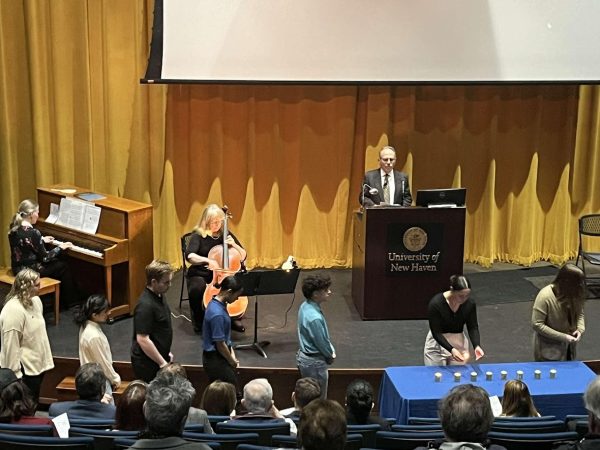Student and OnlyFans creator talks sex-positivity and empowerment
For some people, the sex industry is a taboo subject; for University of New Haven senior accounting major and OnlyFans creator Heather Chandler – who asked to be referred to with the name she uses on OnlyFans – she is living “the best of both worlds.”
Students are now becoming involved in the industry because of platforms such as OnlyFans that have made it easy for them to become creators and gain a following. Despite students using such platforms to exhibit empowerment and sex-positivity, the topics of sex and the sex industry are still stigmatized.
According to the platform’s Twitter account, “OnlyFans is a subscription social platform revolutionizing creator and fan relationship.”
OnlyFans, which launched in 2016, is a subscription-based social media site where users can sell and buy original content, much of which is sexually-explicit. Users must pay a monthly subscription fee ranging between $4.99 and $49.99 to obtain access to the content. Creators have the capability to set prices, host live streams, post photos and videos, interact with users via private messages and receive tips from subscribers, among other features. The platform has even become popular among celebrities such as rapper Cardi B and “Teen Wolf” star Tyler Posey.
Chandler said that for about two years before joining OnlyFans, she had been selling photos to people via social media. On July 15, 2020, she created her OnlyFans account. Chandler is a full-time student but still sets time around her school schedule to create content for the platform and promotional content to publish on her other social media. Now, with her commitment to the platform and the personalized experience she tries to give her followers, she said she is in the top 2.4% of OnlyFans content creators.
Unlike the pornography industry, Chandler said that OnlyFans creators have full control over what they publish and the platform they build.
According to the ABC News Originals and Hulu docuseries “OnlyFans: $elling Sexy,” streaming now on Hulu, OnlyFans has enabled creators to “call the shots” and “anyone can come in from the ground floor and start making money.”
In the documentary, cameras follow creators as they explore “the choices they make as they increase their fanbases and income while facing the real-world impacts and stigma surrounding sex work.”
“I’ve been doing OnlyFans since late July, but I’ve been involved in the sex work industry for over 2 years or so. I’ve made well over $18,000 through OnlyFans (and that’s after OnlyFans takes its 20%),” said Chandler.
Chandler said that prior to OnlyFans taking their share of the profits she earned, she had made $23,495 in eight months. With her income, she was able to move out of her parents’ house.
However, Chandler said she wishes the interface of the website was better, considering the company takes out 20% of revenue from creators.
Along the with profit she has made, she said that her career with OnlyFans has given her a sense of empowerment for herself and sex. Chandler described it as a “huge confidence boost,” as she had to learn to use her image for her brand. With this, she was able to become more comfortable in her own skin and her sexuality.
Chandler is a survivor of sexual violence. She said that being able to take control of her sexuality and approve of the acts that she performs also is empowering.
“For months after that, I felt so gross. I didn’t want to be looked at, I didn’t want to be touched by anyone…Getting control and being able to present myself sexually again, but on my terms was really, really empowering and really helped me heal,” said Chandler.
Despite her success on the platform, Chandler feels that she is unable to talk about her career as freely as she would like to.
“Outside my friend group, I don’t really talk about it. I got harassed on Twitter by some [University of New Haven] kids over the summer for [being an OnlyFans creator], so I try my hardest not to talk about it.”
“I’d love to talk more openly about it in the university setting but I don’t want to compromise my job due to the stigma surrounding OnlyFans, which is awfully unfortunate,” said Chandler.
Chandler said that she sometimes gets nervous that her OnlyFans career will have a negative impact on future employment opportunities, as she feels that the world of business is not yet sex-positive.
Chandler is not the only one who faces stigma about her career in the sex industry. Other social media apps make it difficult for sex workers to promote themselves. Instagram has a restricting feature that flags a post if someone tags or mentions OnlyFans. Workers like Chandler have had to learn to use specific vocabulary to promote their OnlyFans accounts without directly referring to the platforms, such as using the tag “OnlyFanz” instead. And Instagram is not the only platform that Chandler has had an issue with. She has had three TikTok accounts taken down, though she didn’t post explicit content on these accounts.
To be able to promote their accounts on social media platforms, such as TikTok, creators had to turn to call themselves “accountants,” according to Chandler. For example, a viral TikTok sound has become popular among creators on the app.
Chandler said that another obstacle sex workers face is the 2018 Fight Online Sex Trafficking Act (FOSTA) bill and the Stop Enabling Sex Traffickers Act (SESTA) bill. These bills were meant to help prevent online sex trafficking, but according to Chandler, this can harm people in the sex industry who are of-age and have granted consent.
The Anti-Trafficking Review released an article about the harm these bills can have on sex workers. “Many [sex workers] said it was an overbearing, paternalistic law that does nothing to actually fight sex trafficking but, instead, is used to censor sex worker presence online and create more dangerous situations.”
Chandler said that she has gotten into arguments with people who have attempted to undermine her career as a content creator, which she hopes changes. “[Being a creator] shouldn’t be a punchline, and we shouldn’t be reduced down to that.”

Beth Beaudry is a senior majoring in communication with a double concentration in journalism and public relations, and a minor in English. This is her...

Amanda is a senior majoring in communication with a concentration in journalism, and a double minor in political science and English. She has been involved...

Kayla Mutchler is a senior studying communication double concentrating in journalism and digital media. She joined The Charger Bulletin as a staff writer...











